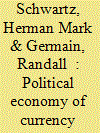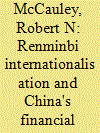| Srl | Item |
| 1 |
ID:
179874


|
|
|
|
|
| Summary/Abstract |
This study analyses how China has engaged and aligned with a new foreign interest in renminbi internationalisation through global allocations in onshore Chinese financial assets, thereby increasing global acceptance of the renminbi as a potential investment and capital currency. The analysis has two major implications. First, the expanding offshore renminbi investment infrastructure, namely Stock Connect and Bond Connect, has enabled China to accommodate large-scale global portfolio investments in its domestic financial markets, without relinquishing its fixed exchange rate regime or having to make various concessions to align with the domestic financial market. Second, the pull effect of index inclusion attracts an expanding base of international investors to Chinese financial assets, from which the process of renminbi internationalisation has benefited. However, geopolitical tensions between China and the home states of the leading foreign portfolio investors could well disrupt the market forces supporting such coordination between China as a currency-issuing state and foreign investors as private currency users, the disturbance of which has increasingly extended to the capital markets.
|
|
|
|
|
|
|
|
|
|
|
|
|
|
|
|
| 2 |
ID:
155160


|
|
|
|
|
| Summary/Abstract |
The rise of China has sparked a debate about the economic and political consequences for the global economy of the internationalisation of the renminbi. We argue that the dominant focus of this literature – primarily the external conditions and requirements for a national currency to become an international currency – misspecifies the connections between the international and domestic requirements for currency internationalisation, as well as the potential to become the dominant international reserve currency. We correct this oversight by developing an integrated theoretical framework that highlights the domestic adjustment costs which a state must accommodate before its currency can carry the weight of internationalisation. These costs constitute a critical element of an international currency’s ‘political economy’, and they force states to negotiate contentious social trade-offs among competing domestic claims on finite public resources in a sustainable manner. Our analysis suggests that the likelihood of China being able to successfully negotiate the social costs associated with running a fully internationalised currency is currently very low, precisely because this will place unacceptable pressure on groups benefiting from the economic and political status quo. This further suggests that the American dollar will remain unchallenged as the global economy’s pre-eminent international currency for the foreseeable future.
|
|
|
|
|
|
|
|
|
|
|
|
|
|
|
|
| 3 |
ID:
120838


|
|
|
|
|
| Publication |
2013.
|
| Summary/Abstract |
Although it is commonly assumed that there are no precedents against which to benchmark Renminbi (RMB), this study argues that the People's Republic of China (PRC) own development experience provides a useful perspective on the internationalisation debate. This study indicates that lessons can be learnt from both the successes and the shortcomings of efforts to internationalise the RMB in the 1970s. During this period, state-owned banks in Hong Kong played a central role in mobilising finance for foreign trade. Access to Hong Kong's financial institutions allowed the PRC to maximise international trade receipts while minimising the risk of undue swings in capital flows. This study shows that although China no longer faces foreign exchange scarcity, economic reforms have not yet resolved vulnerabilities in China's financial institutions. As a consequence, Hong Kong has retained its role in mitigating the risks of internationalisation and as a globalising force for China's banking sector more generally.
|
|
|
|
|
|
|
|
|
|
|
|
|
|
|
|
| 4 |
ID:
120839


|
|
|
|
|
| Publication |
2013.
|
| Summary/Abstract |
There is a widespread view that China's currency can be used in international markets only after the liberalisation of China's domestic financial markets and the opening of its capital account. Yet evidently the renminbi's internationalisation is preceding these so-called preconditions. This article assesses the tensions inherent in renminbi internationalisation starting at a transitional period in China's financial development. For now, effective capital controls allow the Chinese authorities to retain regulated deposit and lending rates, quantitative credit guidance and bond market rationing. Relaxation of the capital controls would put these policies at risk. Reserve requirements can be extended to bank inflows from the offshore market but only at a price.
|
|
|
|
|
|
|
|
|
|
|
|
|
|
|
|